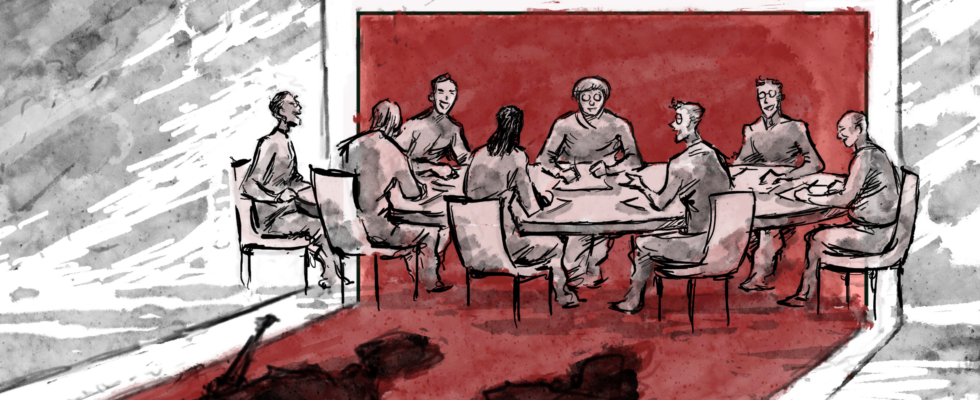On January 7, 2015, Joachim Roncin is in the editorial office of the magazine Stylist, that he created, when the news of the attack on the premises of Charlie Hebdo. Less than an hour later, he tweeted a slogan that would take on incredible proportions, “I AM CHARLIE”, three words written in white and gray on a black background. Nine years later, when he was design director of Paris 2024, he recounted the creation of this slogan in A crazy story, How I created I AM CHARLIE and the journey into absurdity that followed, a book published in early 2024 by Grasset editions.
5 mins
RFI: What pushed you to make this tweet, I AM CHARLIE, less than an hour after the attacks against Charlie Hebdo, this January 7, 2015 ?
Joachim Roncin: It is first of all a sensation, a disbelief in relation to the extreme violence which was happening in the heart of Paris. I had a sort of desire to express myself in relation to that, because I am someone who works with images and I have always worked with images. And so I decided to make an image around what I felt, to say that I was Charlie myself, because it appealed to my childhood, a sort of nostalgia for carefreeness where I saw in particular this magazine lying around on the table in my father’s office, for example, etc. And so it took me back to that whole era, the 1980s, the fact that I saw these cartoonists a lot, whether in the show Droit de respond or at Club Dorothée, in all these shows where we saw these cartoonists, which were part of our daily lives. All of a sudden, something extremely serious happened to them, something which was incredible to me because I didn’t think we could reach people who were making drawings.
Had you measured the scale that this tweet would take, retweeted more than five million times in a few days? ?
We never imagine the power of social networks at that time. We are still ten years ago, that is to say that these are not today’s social networks where we are a little more used to it, we have the knowledge of virality, etc. There, at this moment, we don’t know.
After this tweet, everything goes very quickly. For example, journalists from all over the world call you to ask you to analyze what you yourself don’t understand very well, and even the President of Ukraine asks you for help!
The Ukrainian president’s chief of staff at the time, whose name was Petro Poroshenko, contacted me to tell me that the president wanted to meet with me. So it was a little surprising. Well, I happen to be half-Ukrainian myself on my mother’s side, so I was like, is this a joke? I didn’t really understand. And then one thing led to another, I realized that no, it’s not a joke, that he really wants to meet me, which I’m going to do the next day.
This same president will give me the keys to the city of kyiv, so I am an honorary citizen of the city of kyiv, which is still very surprising. As a token of thanks, like that, he gives me the keys to the city of kyiv and then, he will offer me to take care of Ukraine’s communications. You really have to understand that I go from being a simple graphic designer, artistic director of a very Parisian magazine, etc. — I’m not known, I’m nobody — and then, all of a sudden, I’m being offers to take care of a country — well, in terms of communication.
Subsequently, your slogan was widely used, also to defend causes unrelated to freedom of the press and freedom of expression. What was your reaction?
Since then, there has been a sort of shift in what “Je suis Charlie” originally meant. Today, that can mean for some people: “Look, this is how we think in Franceit’s “Je suis Charlie”, we have the right to shock, even people who don’t want to be shocked.” In short, this slogan has slipped and I am sorry. And that’s also why some time ago, during the European elections, the National Rally, with Jordan Bardella, ran a campaign using this slogan which said “I am a police officer, therefore I vote Jordan Bardella for the elections European Union”, “I am a farmer”, etc. And for the first time, I filed a complaint with the public prosecutor for infringement and misuse of the slogan “Je suis Charlie”.
You defended press freedom with Reporters Without Borders, alongside Christophe Deloire, who has since died, but following these events, your professional career was chaotic and you suffered from depression. It was while writing this book, A crazy story, and by becoming design director of Paris 2024 that you have emerged from this dark period?
To return to my collaboration with Paris 2024 for six years – I was design director since 2018 – I found, I think, a sort of echo of this desire to bring together. And that was very important. And that’s what guides me today in creation, it’s this desire to not necessarily just make images for the sake of making images, but also images that have meaning and create moments that unite brotherhood, like we were able to have this summer.
Listen again to our special editionCharlie, ten years later: Can we talk about everything and how? Where is the press cartoon?
